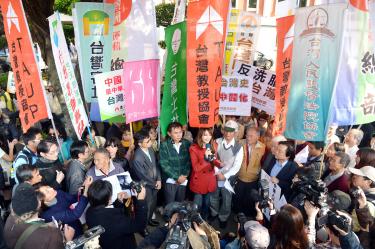Groups yesterday protested the Ministry of Education’s bid to “slightly adjust” the national high-school curriculum, calling the move part of a “brainwashing” policy that would see the new curriculum reflect a more China-oriented perspective.
Despite the groups’ opposition, the ministry later formally approved a new curriculum on Chinese literature and social sciences.
“Taiwanese have fought long and hard to reach a stage where there is much less political influence on our education, so it is therefore unacceptable that the government under the leadership of President Ma Ying-jeou [馬英九] is making an U-turn on this progress,” Jim Lee (李筱峰), a professor at National Taipei University of Education’s Graduate School of Taiwanese Culture, told a rally in front of the ministry in Taipei.
“The so-called ‘slight adjustment’ is not slight at all, it’s a fundamental and dramatic change from a Taiwan-oriented perspective to a China-oriented perspective in education,” Lee added.
Saying that the current curriculum is “too friendly” when it comes to describing the period when Japan controlled Taiwan and unconstitutional when describing China, ministry officials and members of its curriculum outlines adjustment task force have proposed calling the era of Tokyo’s rule the “Japanese colonial period” and referring to “China” as “Mainland China” in textbooks.
They also proposed making adjustments to the description of the period when the nation was under the Chinese Nationalist Party’s (KMT) authoritarian regime.
“I am totally opposed to replacing Taiwan’s perspective for China’s in our nation’s history classes,” National Taipei University student Lai Pin-yu (賴品妤) said. “Taiwanese history can be neither Chinese history, nor KMT history.”
National Taiwan University history professor Chen Tsui-lien (陳翠蓮) criticized the government for making such dramatic changes clandestinely.
“These are major alterations and therefore require more public participation,” she said.
As the groups protested outside the ministry, another group of demonstrators led by the Alliance of Referendum for Taiwan tried to block the entrance to the National Academy for Educational Research (NAER), where the curriculum task force was meeting.
“We’re here to stop the task force from making rash decisions without consulting the public,” alliance convener Tsay Ting-kuei (蔡丁貴) said. “This is such a controversial issue, it should not be decided without having more public discussions — especially when NAER vice president Tzeng Shih-jay [曾世杰] promised us on Friday that he would organize public hearings before making any decisions.”
The protesters briefly stopped some task force members from entering the building, but were removed by police after severe clashes.
The ministry said the changes are based on the 12-year national education system, which is set to be implemented in August, and aimed at achieving better continuity between junior-high and senior-high school textbooks.
After reviewing the curriculum on literature and social sciences, the ministry said it would next review health and physical education.
The Democratic Progressive Party (DPP) condemned the ministry for not halting the initiative.
“The ‘adjustment’ of the curriculum outlines is not an adjustment, but a total overhaul,” DPP spokesperson Xavier Chang (張惇涵) said.
The ministry’s changes “seriously conflict” with most people’s understanding about the nation’s history and geography, Chang said, adding that more than 85 percent of respondents in a DPP opinion poll say that the country’s territory includes Taiwan, Penghu, Kinmen and Matsu, but not “mainland China.”
Source: Taipei Times - 2014/01/28





















